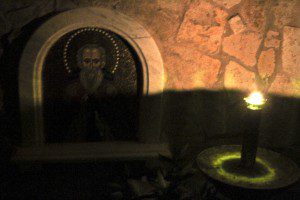
Earlier this summer, a friend from Russia asked me to review a book that had been translated from Russian into English. She wanted me to just read through it and tweak the translations to be more conversational. I’m barely literate in English, but my friends who are multilingual tell me that one of the greatest challenges in translating written works is maintaining the author’s voice in the new language while making things seem natural.
The book was about Mount Athos, a mountain on a peninsula in Greece that is dotted with Eastern Orthodox monasteries and has been for nearly 1000 years. Reading through Ways of the Holy Mountain I was intrigued by the history and events that shaped the dozens of monasteries and the approximately 1400 monks who live in them today. (It has moved to the top of my bucket list of places to visit.)
If you’ve never been in a holy place that is that old, you’re missing something. Even the harshest non-believer can’t help but feel the decades of human emotion that are imbued on a place like that. While nothing exists in the United States that is that old, you can feel the same power and depth in places like Arlington National Cemetery or the 9/11 memorials in New York or Washington DC. Regardless of your feelings of “religion” and Orthodox versus Catholicism versus Protestantism versus any of the other world religions, you can find respect for these men and the way they choose to live their lives.
All too often, people post “sayings” and thoughts for the day on social media, without really reading them or understanding them—as long as it comes with an interesting picture. I generally ignore all of them. Most of the time you have to question the people quoted and even the content of the quote. I have seen quite a false attributions or changed quotes because someone didn’t exactly like the way it read or tweak it so it better supports their own political leanings.
At the end of the manuscript I reviewed, there was a document that included quotes from many of the monks on the island. I was struck by how many of them were fantastic platitudes that many of us (and I am definitely including myself here) could stand to remember in our daily lives. There was no “twist” to anything, just their feelings. I have copied a few that I liked best. My favorite is the last one…
- Abba Arsenius said about himself: “After a conversation I often regret, after silence – never”.
- If you want to learn to speak well and infallibly, first you should learn to keep silence. (Schemamonk Zosimus)
- If you want to gain peace now and in the future, always say to yourself: “Who am I?” and do not condemn anyone. (Abba Joseph)
- A Christian is one who takes after Christ in words, deeds and thoughts as much as it is possible for a human being. (St. John of the Ladder)
- Do not say: “I cannot.” This phrase is not Christian. The Christian word is: “I can do everything,” but not by myself – with the help of our God who strengthens us as Apostle Philip says. (St. Theophanes the Anchoret)
- Do not like to listen to people about the demerits of others and you will have fewer demerits yourself. (St. Ambrosius of Optina)
- Do not tell anyone about a good action you are going to do beforehand, just do it. (St. Antony the Great)